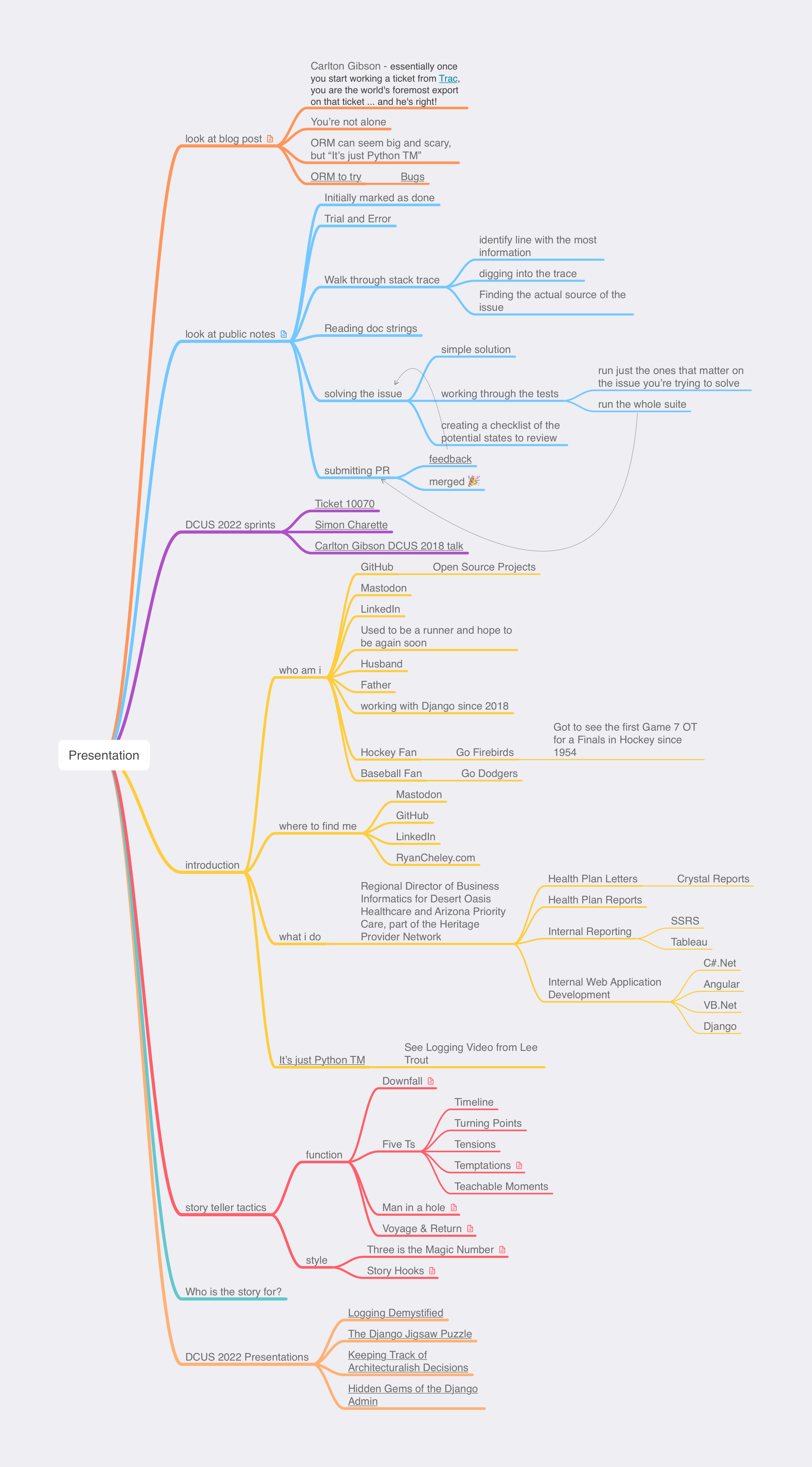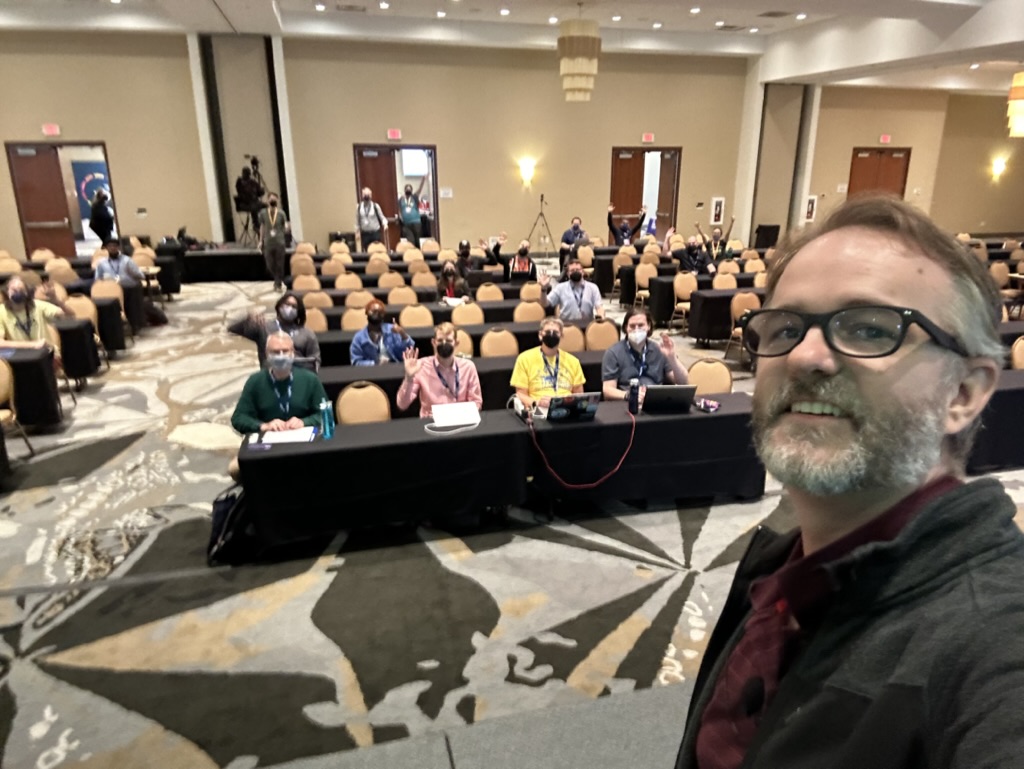DjangoCon US 2024 Talk
At DjangoCon US 2023 I gave a talk, and wrote about my experience preparing for that talk
Well, I spoke again at DjangoCon US this year (2024) and had a similar, but wildly different experience in preparing for my talk.
Last year I lamented that I didn't really track my time (which is weird because I track my time for ALL sorts of things!).
This year, I did track my time and have a much better sense of how much time I prepared for the talk.
Another difference between each year is that in 2023 I gave a 45 minute talk, while this year my talk was 25 minutes.
I've heard that you need about 1 hour of prep time for each 1 minute of talk that you're going to give. That means that, on average, for a 25 minute talk I'd need about 25 hours of prep time.
My time tracking shows that I was a little short of that (19 hours) but my talk ended up being about 20 minutes, so it seems that maybe I was on track for that.
This year, as last year, my general prep technique was to:
- Give the presentation AND record it
- Watch the recording and make notes about what I needed to change
- Make the changes
I would typically do each step on a different day, though towards the end I would do steps 2 and 3 on the same day, and during the last week I would do all of the steps on the same day.
This flow really seems to help me get the most of out practicing my talk and getting a sense of its strengths and weaknesses.
One issue that came up a week before I was to leave for DjangoCon US is that my boss said I couldn't have anything directly related to my employer in the presentation. My initial drafts didn't have specifics, but the examples I used were too close for my comfort on that, so I ended up having to refactor that part of my talk.
Honestly, I think it came out better because of it. During my practice runs I felt like I was kind of dancing around topics, but once I removed them i felt freer to just kind of speak my mind.
Preparing and giving talks like these are truly a ton of work. Yes, you'll (most likely) be given a free ticket to the conference you're speaking at — but unless you're a seasoned public speaker you will have to practice a lot to give a great talk.
One thing I didn't mention in my prep time is that my talk was essentially just a rendition of my series of blog posts I started writing at DjangoCon US 2023 (Error Culture)
So when you add in the time it took for me to brainstorm those articles, write, and edit them, we're probably looking at another 5 - 7 hours of prep.
This puts me closer to the 25 hours of prep time for the 25 minute talk.
I've given 2 talks so far, and after each one I've said, 'Never again!'
It's been a few weeks since I gave my talk, and I have to say, I'm kind of looking forward to trying to give a talk again next year. Now, I just need to figure out what I would talk about that anyone would want to hear. 🤔
So you want to give a talk at a conference?
Last October I gave my first honest to goodness, on my own, up on the stage by myself talk at a tech conference. It was the most stressful yet fulfilling professional experience I've had.
Fulfilling in that I've wanted to get better at speaking in public and this helped in that goal.
Stressful in that I really wanted to do a good job and wasn't sure that I could, or worse, that anyone would care about what I had to say.
Well, neither of those things turned out to be true. I did get a lot of good feedback which tells me I did a good job, and people were very encouraging for the words that I had to say, so people did care.
My presentation went so well that I was even interviewed by Jay Miller.
You can see my actual talk here, but I thought it would also be interesting for you to see how I got here.
Submitting the idea
I submitted my talk idea for DCUS 2023 in May and it was selected in June. That gave me roughly 3 months to get my loose outline of an idea into a 45 minute talk.
Brain storming how the talk would go
I have tried to get a better workflow for brainstorming ideas in general, but I really wanted to up my game for this talk. To that end I used the Story Teller Tactics cards to help determine the path of the story I would tell in my presentation.
That helped when I got to mind mapping1 my talk.

The use of the Story Teller Tactics, combined with my mind map, lead to a starting point for creating my presentation
My 'Oh Sh%t moment'
Back in early July I was browsing Mastodon (instead of working on my presentation) and came across a link to an article with the title How To Become A Better Speaker At Conferences. I saved it to my read it later service and went on browsing. A few weeks later I actually read the article (around July 25).
This bit of advice got me a little worried:
On a practical level, a 45-minute talk can take a surprisingly long time to put together. I reckon it takes me at least an hour of preparation for every minute of content.
Yikes! That means I would need to prepare and rehearse and prepare for 45 hours over the course of 14 weeks (almost 4 hours per week on average). So I set up a schedule for how I would meet this requirement
Working on the presentation
I spent all of August and the early part of September working on my presentation for about 3 hours a week. Adding slight tweaks to it here and there. I conducted a dry run with my team at work to assess my presentation's progress.
The dry run went fine, but it was clear that my presentation was missing something.
Asking for feedback
Django Con offers up mentors to help you work on your talk. If you're newer to giving presentations, I highly recommend engaging with one of them. The feedback they provide is priceless!
I had the great fortune to reach out to Katie McLaughlin who had just given a talk at PyCon Australia titled Present Like a Pro. I watched that before reaching out to her and she gave some very good advice on presentation.
Getting serious about preparing for the talk
As I said, I had done a dry run with my team at work and it was fine but I could tell that the way I was working on my presentation wasn't getting it to where I wanted it to be. So I decided to go all in on practicing and trying to make it the best I could. In order to accomplish that I believe I would need to engage in deliberate practice by actually giving my presentation. This was a breakthrough moment for me in improving the presentation and my deliver of it.
In order to have deliberate practice I set up the following routine:
- Give my presentation and RECORD it
- Watch my presentation and make notes about what needed to be improved
- Update my presentation based on the notes from #2
- Go back to step 1
Steps 1 - 3 were done on different days. For example, on Monday I would record me giving the presentation; on Tuesday I would watch the presentation and make notes; on Wednesday I would update the presentation based on my notes from Tuesday; on Thursday I would start over.
I did this a total of 7 times over 21 days. Two of these times when giving the presentation I gave it to a 'live' audience and was able to get feedback from them on various parts of the presentation.
I did one final dry run on October 13th (the Friday before my presentation was to happen for real)
That Friday was the last time I even looked at my presentation before giving it. I know some people will talk about making updates on the plane ride to the conference, or the night before, or the hour before, but that would stress the crap out of me, and I was already stressed out enough!
Giving my talk for Real
On Monday October 16th I gave my talk in front of people, in real life, for the first time. Here I am up on stage with the crowd in the background

All in all it was a really fulfilling experience, but it was pretty hard too. This was the first time I spoke at a Tech Conference and I really wanted to do well.
As I said before, I received some really good feedback on the talk and I was really glad to have done it.
Now, you might ask, "Would I have to go to all of this trouble to prepare for a talk?"
Maybe, maybe not. I just happened to find this particular prep process worked well for my brain.
It was nice to hear from some of the attendees surprised that my talk was the first honest to goodness talk on my own I had ever given because it sounded so polished and well done.
Practice makes better, and in this case (based on the videos) it sure did for me
A Big Thank you
A presentation like this took a lot out of me, but I am extremely grateful to a few people in particular:
- Katie McLaughlin
- The Team of Web Developers at work
- Bookie
- Chris
- Jason
- Jon
- My daughter Abigail
A little bit extra
If you want to see more details on my talk, here is a playlist of the dry run attempts I did to prepare2
If you want to see the repo where the changes were tracked for my presentation it can be found here
If you want to see my annotated slides, you can find them here
Time tracking
I time track the crap out of my work day, and I really wish I would have done that here just to get a more exact idea of how much time I spent preparing, but some basic back of the envelope math gives me nearly 56 hours of prep for this. One thing I do religiously for work is track my time. I do this for a couple of reasons, but for some reason, I didn't do that as I prepared for my talk here. The time I have here is mostly estimates based on my memory (which could be wildly over stated, or understated).
| Activity | Time Spent |
|---|---|
| Story Teller Tactics Work | 1.5 Hours |
| Mind Mapping Talk | 3 hours |
| Initial Draft of Presentation | 5 Hours |
| Presentation Updates | 18 Hours |
| Deliberate Practice | 28 Hours |
| Total Time | 55.5 hours |